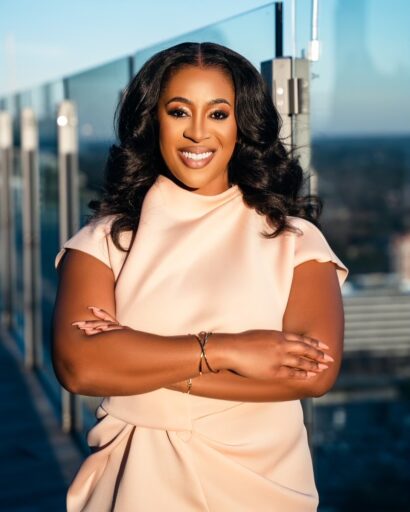Going from being the only Black girl in her AP classes to graduating from Spelman College left a profound impact on organizational psychologist Dr. Ella Washington, an expert on the science of human behavior in the workplace. As Black women make strides in corporate America, Washington recognizes there is still a ways to go to make the playing field even for others.
According to McKinsey & Company’s 2021 Women in the Workplace Study, women of color make up just 7% of corporate VP roles compared to 56% of white men in those roles. The gap widens at 4% for C-suite corporate positions compared to 62% being white men.
“Just like a fly-by-night marriage, people do get really emotional and excited about DEI or they see something on TV and really invigorates them. However, that does not create a lasting strategy,” Washington says. “What creates a lasting strategy is to have a plan in place and a huge part of that is that accountability.”
In our exclusive interview, Washington tells us her plans on making DEI a long-term strategy, her upbringing in Durham, North Carolina, gives insight into her book and where companies thrive or fall short of expectations. Read the edited excerpt below.
Senior Executive DEI Think Tank is a criteria-based membership community for chief diversity officers and senior-level DEI leaders at large organizations to share difference-making tactics, trade valuable resources, and seek the counsel of experienced peers in a private, confidential setting.
Do you qualify?Senior Executive Media: What’s the concept behind the “necessary journey” you reference in your book, “The Necessary Journey: Making Real Progress on Equity and Inclusion?“
Dr. Ella Washington: Whenever we’re looking to make a change or keep a goal in life, we often describe it as a journey… What I found was that many organizations didn’t really understand what that means, and it became clear when many countless organizations and their CEOs and the chief resource officers would pull me aside and ask me: “Where are we on the journey? How do we prepare our people?” With that, I understood that there needs to be some demystification of the DEI journey. [It’s] really about how to make real progress on equity and inclusion.
Each client is on a different part of their journey. Some of them are just starting off and they’re like, “okay, we said we were doing DEI [initiatives] and then they realize we haven’t done anything as far as I can do. Where do we start?” And other clients are those who have been on this journey for quite some time and they’re like, “what we’re doing is not working” or “we want to reinvigorate it.” I think the connective tissue is that clients understand where they are on a journey and [are] working with me to determine where they want to go and you know, I help them to fill those gaps.
Senior Executive Media: What are the issues that clients bring to you? And you kind of give us some examples of those but if you have more, feel free to share?
Dr. Ella Washington: Some things that clients are really talking about are trends. Thinking about how hybrid and flexible work is having an impact not only on their workplace culture, but also on their DEI efforts. What do [leaders] do now that so many people are working hybrid? What do they need to watch out for? Other things that [they] are asking me about are generational shifts in the workplace. There’s a lot of asking for more flexibility as opposed to money. Some of the allure of sound careers such as those finance careers where you had to work your whole life away and you were promised to make a whole bunch of money. People are leaving those jobs, because they want more flexibility. It’s not that they don’t want money, but they’re either finding multiple ways of making money, or valuing family differently. I think 2020 shifted a lot for everyone, but especially with Gen Z.
Recently quiet quitting and firing has been all the rage. And I’ve had a lot of conversations with the DEI perspective asking why does this happen? Why do employees disengage? Why do employers disengage? A lot of it comes down to a culture that lacks transparency around expectations that also lacks the ability to relax the expectation of having a tough conversation around performance and having a tough conversation around the needs of the employee. DEI is in this like little bubble where it’s only if we’re talking about race, gender, sexual orientation, right? That’s part of it, but as I often say in my work DEI is about elevating humanity. If you think about all of the things that make us human, that is DEI, and those things into the workplace and organizations have to navigate them.
“DEI should be seen as an integral part of the business because it helps a business perform but also because it is connected to the mission and values of the company.”
Senior Executive Media: What is it that the clients are really struggling with and what are they doing great?
Dr. Ella Washington: There’s no one size fits all for DEI… Companies should all be looking at purpose, pitfalls, and progress. So the purpose would be what [are they] actually trying to achieve. As I mentioned, in 2020, there was a lot of excitement, but there was not a lot of clarity on what exactly we’re trying to do in this DEI space. Just like any other business strategy, you got to know what you’re trying to accomplish with this strategy, right? Are you trying to sell a million units of a new product? Are you trying to double the size of your workforce? You have to have a clear purpose and clear goals.
The second thing is pitfalls. So where have we missed the mark? What mistakes can be made? What are our blind spots? How do we uncover those? No one’s perfect, not even some of the shining organizations in the book; PwC is a great example. They wonderfully honored their DEI [journey], but they’re not perfect. They were honest and talked about some of their mistakes and pitfalls. Every company has them like every person has them.
The third thing that clients struggle with is progress. How do we know when we’re making progress? What does progress even look like? Yes it’s upsetting to think of it as a metric, but it’s also making sure we know where that accountability structure is… That doesn’t just happen because we say we wish it to be so. Who’s responsible outside of HR to make that happen?
Senior Executive Media: As far as others on the necessary journey, how would you say that they met expectations?
Moss Adams is an example of a company who had very strong DEI efforts over the years but realized during the events of 2020 that they needed to do more… In 2020, they were trailblazers with achieving gender equity throughout their organization but they had not made much progress on race. When they felt the impact of the racial reckoning of 2020 and heard from employees, they realized the gravity of the situation. It felt like a brand new journey even though in one area they were really strong and in another area they were really missing the mark. They were very intentional about creating a racial equity strategy and started to replicate the progress they had seen many years before their gender diversity journey.
Senior Executive Media: What are businesses doing great at as far as integrating DEI?
Dr. Ella Washington: I think some companies have really leaned into data analytics as a powerful way to understand their current state throughout DEI, but also to create strategies and metrics to move them forward. What gets measured gets done. And it’s most helpful to understand where you are using certain data, as opposed to just setting lofty goals in the future and not having a strong understanding of where those metrics might develop. I hope they continue to lean into that because data is powerful and the inclusion and equity part of DEI is often hard to quantify. Quite frankly, people think about metrics and they think about demographic diversity. [This includes] equity in terms of our processes, [being] equitable across all groups, are if there any unintended consequences with data can help us with inclusion in terms of how people are feeling in the organization. So looking at metrics like attrition and other indicators that people are not liking, but also cultural surveys and other metrics that help us to get at that more qualitative side, but also put some data behind.
Senior Executive Media: How do people make these things a long term practice?
Dr. Ella Washington: First, there has to be a strategy in place. It can’t just be on a whim. If you wake up and decide you’re gonna get married tomorrow without putting the right structure in place, that marriage probably isn’t gonna last… How are we going to make sure that we don’t take our foot off the gas, even if we have changes in leadership or even if we have, if we go through tough economic times?
It’s not a one size fits all. But you have to look at it like any other business strategy. Companies don’t abandon their marketing strategy if it doesn’t work out in the first year. If they go through hard economic times, maybe they shift, maybe they figure out additional resources or downsize resources. DEI should be seen as an integral part of the business because it helps a business perform but also because it is connected to the mission and values of the company.




